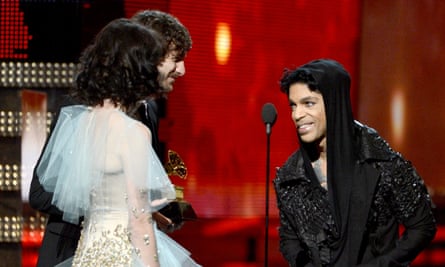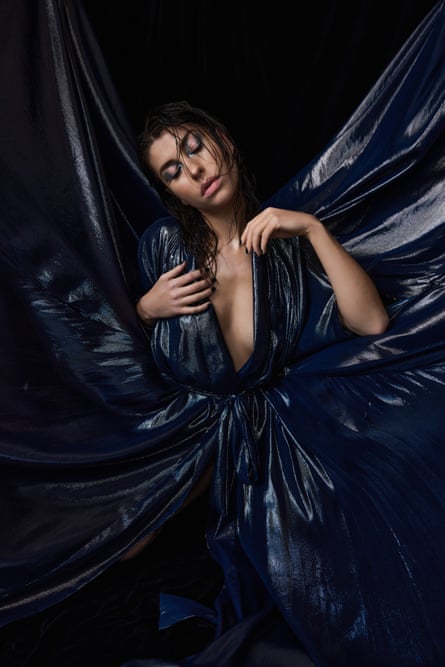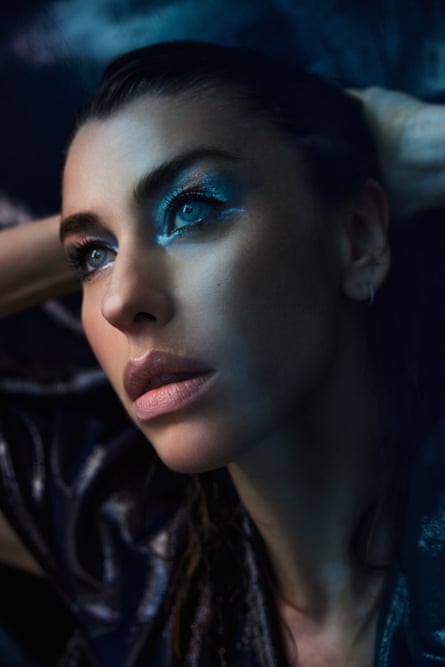Lately, Kimbra has been thinking about her anxiety. It’s something she’s long struggled with but has begun to take more seriously as an adult. “I have a really challenging career, so sometimes I [feel like], why me? Then I’m like, well, it makes sense,” she says, her native Kiwi accent dulled by years of living in the US. “Any young woman who was thrown into the spotlight young, who has to think every day about how they appear, to be scrutinised, and has a lot of people putting money into their career – obviously, I’m going to be susceptible to anxiety.”
Kimbra Lee Johnson, who you probably know mononymously, has been in the public eye for most of her life. She began performing and making music at 11 (see the adorable clip of her declaring “one day, I’d love to be a pop star” on a New Zealand children’s show). At 17, she signed a management deal with financing, part of a long game plan to get her ready to launch as an artist, “which is a huge privilege but fucking pressure as well”. By the time she was 21, she had achieved the sort of success most musicians can only dream of when she appeared on the 2011 Gotye hit Somebody That I Used to Know, which topped the charts in 23 countries, was awarded two Grammys and now ranks among the bestselling digital singles of all time. Her debut album, released soon after, went platinum in Australia and New Zealand and proved her flair for creating interesting, left-of-centre pop songs that are more Björk than Britney Spears.
Now aged 32, Kimbra is preparing to share her fourth album, A Reckoning. It’s her first release as an independent artist, which feels significant given her early years as a major label darling. She got her childhood wish to become a pop star, but can now reflect on both the good and bad that it brought. The Hamilton-born artist loves performing and feels music is her purpose. But success has also meant challenge and sacrifice.
“It’s a pretty lonely life,” Kimbra says, before sitting in one of the many long pauses she will take during our conversation, choosing her words carefully. “Not a lot of people can really understand the pressures that you’re under. And I think loneliness is responsible for a lot of things. When you’re lonely, then you get more in your head and then your mental health goes out [the window].”
Of course, Kimbra couldn’t have known what she was signing up for when this all began. At 17, as soon as she finished high school, she relocated from New Zealand to Melbourne to begin work on her debut album, expanding on tracks she wrote when she was 15, including Settle Down and The Build Up. Suddenly, she went from a “pretty normal” teenager with lots of friends and hobbies to being alone in a new city, her life revolving around work. It was a difficult transition, but in 2010 the hard work paid off and she signed with Warner. The deal was brokered by her then-manager Mark Richardson, an industry veteran who had flown to Auckland to meet Kimbra and her parents after hearing a demo on her MySpace page.
Richardson had put her in the studio with producer François Tétaz to work on the album. At the time, Tétaz was also working on the next album from singer-songwriter Wally de Backer, AKA Gotye. The pair asked Kimbra if she would be interested in singing on an offbeat, spacey Gotye song that they were trying to find the right guest vocalist for – Somebody That I Used to Know.
“She laid that vocal down in her bedroom with Wally and the rest is history,” Richardson remembers. “It just blew up.”
Suddenly, Kimbra was everywhere. Vows, the debut album the 21-year-old had been working on quietly for years, was released a month later. But the success of Somebody That I Used to Know was “challenging” for Kimbra, Richardson thinks.
“It’s like a massive adrenaline shot,” he describes. They were in the process of developing Kimbra as an artist, which had been moving at a nice pace pre-Gotye. “And then the next minute, she’s on stage getting a Grammy from Prince … It’s difficult to handle that. Because suddenly you get given everything, rather than slowly, progressively, earning everything.”
Kimbra wishes she could have enjoyed or even remembered that time more, instead of constantly thinking about the next thing. “But this is stuff that you don’t really know when you’re 20,” she says. She learned how nonstop touring and her “all-consuming” focus on music could disconnect her from friends, and that fame could be a double-edged sword.

“I don’t like the transactional part of fame, where I exist to be an accessory for your Instagram photo. I don’t like feeling like a product. I don’t like having to uphold a fantasy all the time,” she lists. “The expectation of always having to look like a pop star is exhausting. And I don’t like how narcissistic fame is. I spend so much time looking at myself; it’s really boring – in the mirror, approving promo photos, making things on social media. There’s a self-absorbed part of fame where you have to always be on watch. It’s a price I’m willing to pay … I just wish it wasn’t so ‘me, me, me’. Because I truly mean it – it truly is boring to only think about yourself, and fame does that. It just creates an echo chamber.”
By 2014, Kimbra pulled the brakes. She began to work on her second album, The Golden Echo, in Los Angeles. It was the turning point in her career. Richardson says the pressure was on from her label after Vows and the Gotye track to deliver a big follow-up album; a desire that was sometimes at odds with Kimbra’s own vision. “She was trying to push the bounds of music,” Richardson says. “She didn’t want to be moulded into the next Katy Perry.”
Excited by her new access to artists whose work she’d long admired, Kimbra crammed the record with big ideas and big collaborations with the likes of John Legend, Daniel Johns and Thundercat. “There was no organic flow with it … and I think that it just got a bit lost, to be honest,” Richardson says.

The Golden Echo divided critical opinion and did not replicate the commercial success of her debut. Kimbra was happy in her decision to “go weird” with the album, and is nonchalant about how it fared. “It probably wasn’t a smart commercial move, but, oh well. I like it,” she says.
Richardson and Kimbra parted ways after that. She moved to New York and four years later she released her third album, Primal Heart. There were “always the hopes that I would have more pop success”, Kimbra says. But it didn’t chart well, and soon after she exited her record deal with Warner, feeling she and the label were no longer on the same page.
“I was on a six-album deal and they wanted to extend it to eight albums and choose my next producer. Nope,” she says. “They want to sign SoundCloud rappers – it just wasn’t the right fit any more.”
In the years since that split, Kimbra has been through an intense period of personal challenges that include the sudden death of her best friend, breakups and navigating New York during the apocalyptic early days of the pandemic. She had to confront the way she processes big, heavy emotions and the “scary stuff” that lives inside her, including the destructive ways she says her anxiety can sometimes manifest. She began thinking about the afterlife more, delved deeper into spirituality. All of this was poured into her fourth album – one that is sonically more pared back than her previous work, with plenty of darker, more introspective tracks, such as the haunting lead single Save Me. Writing it was a salve.
“I’m just so grateful to God that I have music because I don’t know how else I would get out that tension, that chaos,” she says. “I have a lot of interior dialogues, and they’re not always kind.”
When she’s at home in New York, Kimbra enjoys simple pleasures: yoga, painting watercolours, walking her dog and watching “shitty reality TV like everyone else”. And now she’s an independent artist, she feels “liberated” in her work; no longer having to deal with expectations from a label about how her music should sound.
“I just want to make music I like,” she says. “I can’t go and sell something that I don’t believe in … I’m leaving behind a legacy. I want to make shit that’s going to matter when I die.”
Having been through the major label machine and come out the other side, Kimbra sees positives and negatives. The music industry can be exploitative, patriarchal and “very shady in the way it’s set up”, she says. But she also knows she owes a lot of her success to people in the industry who believe in her. She has begun producing for other musicians – something that offers her a healthy sense of detachment – and wants to mentor more young female musicians.
Looking back, “it’s crazy to think of how ambitious I was as a kid”, she says of those early days of her career when she threw her everything into music. But everything that happened along the way feels as though it was leading her here.
“[Without it], I wouldn’t be able to help other young women through anxiety and the pressures of the music industry. I wouldn’t have all these things to offer. You know how if someone has been married to the same person all their life, and they’re trying to give you relationship advice – you’re like, well, you don’t really know,” she says. “So I wouldn’t change anything.”
A Reckoning is out on 27 January. Kimbra is touring Europe throughout January, and North America in February and March

